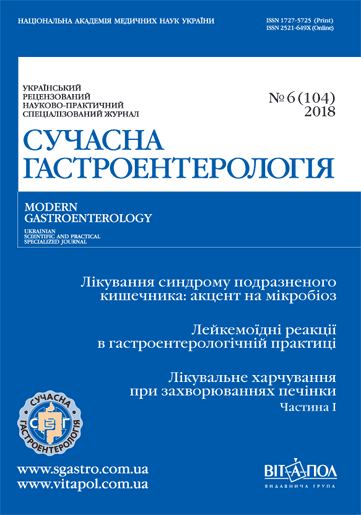Нові напрями в лікуванні синдрому подразненого кишечника: акцент на мікробіоз
DOI:
https://doi.org/10.30978/MG-2018-6-56Ключові слова:
синдром подразненого кишечника, фекальна трасплантація, мікробіомАнотація
Фекальна трансплантація — процес пересадки очищеного фекального матеріалу від здорового донора до реципієнта. Є докази позитивної ролі фекальної трансплантації у лікуванні низки захворювань, зокрема синдрому подразненого кишечника. Наведено дані щодо режимів лікування синдрому подразненого кишечника та їх ефективності, досвіду використання фекальної трансплантації у терапії синдрому подразненого кишечника.
Посилання
Ashton В et al. The role of bacteria, probiotics and diet in IBS. Gastroenterology. 2018;7(2):13.
Brandt LJ. An evidence-based systematic review on the management of irritable bowel syndrome. Am J Gastroenterol. 2009;104 (suppl. I):8-35.
Bruno K et al. A review of microbiota and IBS: Future in therapies. Advances in Therapy. 2018;35(3):289-310.
Cash BD, Lembo A, Aggarwal K et al. Mo1291 Improvements in IBS-related quality of life in a randomized, controlled repeat treatment (TARGET 3) of rifaximin for IBS-D. Gastroenterology. 2015;148. P. S-663.
Colman RJ, Rubin DT. Fecal microbiota transplantation as therapy for inflammatory bowel disease: a systematic review and meta-analysis. J Crohns Colitis. 2014;8:1569-1581.
Currò D et al. Probiotics, fibre and herbal medicinal products for functional and inflammatory bowel disorders. Br J Pharmacol. 2017;174:1426-1449.
Didari Т. Effectiveness of probiotics in irritable bowel syndrome: Updated systematic review with meta-analysis. World J Gastroenterol. 2015;14:3072-3084.
Dai C, Zheng CQ, Jiang M. Probiotics and irritable bowel syndrome. World J Gastroenterol. 2014;19:5973-5980. doi: 10.3748/wjg.v19.i36.5973].
Eiseman B, Silen W, Bascom GS, Kauvar AJ. Fecal enema as an adjunct in the treatment of pseudomembranous enterocolitis. Surgery. 1958;44:854-859.
Gibson GR. Expert consensus document: The international scientific association for probioticsand prebiotics (ISAPP) consensus statement on the definition and scope of prebiotics. Nat Rev Gastroenterol Hepatol. 2017;14:491-502.
Gough E, Shaikh H, Manges AR. Systematic review of intestinal microbiota transplantation (fecal bacteriotherapy) for recurrent Clostridium infection. Clin Infect Dis. 2011;53:994-1002.
Hungin AP, Chang L, Locke GR et al. Irritable bowel syndrome in the United States: prevalence, symptom patterns and impact. Aliment Pharmacol Ther. 2005;21:1365-1375.
Halkjær SI, Boolsen AW, Günther S et al. Can fecal microbiota transplantation cure irritable bowel syndrome?. World J Gastroenterol. 2017;22:4112-4120.
Halkjær SI, Christensen AH. Faecal microbiota transplantation alters gut microbiota in patients with irritable bowel syndrome: results from a randomised, double-blind placebo-controlled study. Gut. 2018;67 (12):2107-2115.
Johnsen PH, Hilpusch F, Cavanagh JP et al. Faecal microbiota transplantation versus placebo for moderate-to-severe irritable bowel syndrome: a double-blind, randomised, placebo-controlled, parallel-group, single-centre trial. Lancet. Gastroenterol Hepatol. 2017;3(1):17-24. doi: 10.1016/S2468-1253/17
Jones ML, Martoni CJ, Tamber S. Evaluation of safety and tolerance of microencapsulated Lactobacillus reuteri NCIMB 30242 in a yogurt formulation: a randomized, placebo-controlled, double-blind study. Food Chem Toxicol. 2012;50:2216-2223
König J. Consensus report: faecal microbiota transfer — clinical applications and procedures. Aliment Pharmacol Ther. 2017;45(2):222-239.
Lovell RM, Ford AC. Global prevalence of and risk factors for irritable bowel syndrome: a meta-analysis. Clin Gastroenterol Hepatol. 2012;10:712-721.
Longstreth GF. Functional bowel disorders. Gastroenterology. 2006;130:1480-1490.
Lacy BE, Patel NK. Rome criteria and a diagnostic approach to irritable bowel syndrome. J Clin Med. 2017:99.
Lacy BE. Diagnosis and treatment of diarrhea-predominant irritable bowel syndrome. Int J Gen Med. 2016;9:7-17. doi: 10.2147/IJGM.S93698.
Negro V. Low-FODMAP diet improves irritable bowel syndrome symptoms: a meta-analysis. Nutrients. 2017;9:940. doi:10.3390/nu9090940.
Öhman L, Simrén M. Intestinal microbiota and its role in irritable bowel syndrome (IBS). Curr Gastroenterol Rep. 2013;15:323.
Pace F, Pace M, Quartarone G. Probiotics in digestive diseases: focus on Lactobacillus GG. Minerva Gastroenterol Dietol. 2015;61:273-292.
Pinn DM, Aroniadis OC, Brandt LJ. Is fecal microbiota transplantation (FMT) an effective treatment for patients with functional gastrointestinal disorders (FGID)?. Neurogastroenterol Motil. 2015;27:9-29.
Pozuelo M, Panda S, Santiago A et al. Reduction of butyrate- and methane-producing microorganisms in patients with irritable bowel syndrome. Sci Rep. 2015;5:12693. doi: 10.1038/srep12693
Quigley EM. Therapies aimed at the gut microbiota and inflammation: antibiotics, prebiotics, probiotics, synbiotics, anti-inflammatory therapies. Gastroenterol Clin North Am. 2011;40:207-222.
Qian Chen. A Novel prebiotic blend product prevents irritable bowel syndrome in mice by improving gut microbiota and modulating immune response. Nutrients. 2017;9:1341. doi:10.3390/nu9121341.
Rossen NG, Fuentes S, van der Spek MJ et al. Findings from a randomized controlled trial of fecal transplantation for patients with ulcerative colitis. Gastroenterology. 2015;149:110-118.
Ron Y. Irritable bowel syndrome: epidemiology and diagnosis. Isr Med Assoc J. 2003;N 4:244-250.
Rajilić-Stojanović M, Biagi E, Heilig HG et al. Global and deep molecular analysis of microbiota signatures in fecal samples from patients with irritable bowel syndrome. Gastroenterology — 2011;141:1792-1801.
Surawicz CM, Brandt LJ, Binion DG et al. Guidelines for diagnosis, and prevention of Clostridium difficile infections. Am J Gastroenterol. 2013;108:478-498.
Suez J. Post-antibiotic gut mucosal microbiome reconstitution is impaired by probiotics and improved by autologous FMT. Cell. 2018;174(6):1406-1423.
Shanahan F, Quigley EM. Manipulation of the microbiota for treatment of IBS and IBD-challenges and controversies. Gastroenterology. 2014;146:1554-1563.
Staudacher HM, Irving PM, Lomer MC et al. Mechanisms and efficacy of dietary FODMAP restriction in IBS. Nat Rev Gastroenterol Hepatol. 2014;11:256-266.
Trving PM, Lomer MC et al. Mechanisms and efficacy of dietary FODMAP restriction in IBS. Nat Rev Gastroenterol Hepatol. 2014;11:256-266.
Vrieze A, Van Nood E, Holleman F et al. Transfer of intestinal microbiota from lean donors increases insulin sensitivity in individuals with metabolic syndrome. Gastroenterology. 2012;143:913-916.
Xia Yang. et al. Effect of EPEC endotoxin and bifidobacteria on intestinal barrier function through modulation of Toll-like receptor 2 and Toll-like receptor 4 expression in intestinal epithelial cell. Gastroenterol Hepatol. 2013;9:560-569.
Zhang F, Luo W, Shi Y. Should we standardize the 1,700-year old fecal microbiota transplantation. Am J Gastroenterol. 2012 — Vol. 107:1755.
Zmora N. Personalized gut mucosal colonization resistance to empiric probiotics is associated with unique host and microbiome features. Cell. 2018;174(6):1388-1405.





